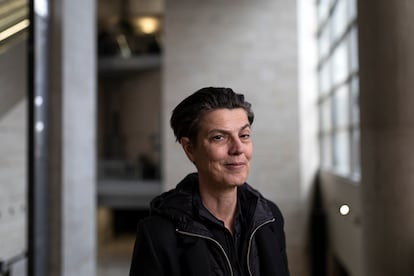Carolin Emcke, philosopher: ‘Confusion is manufactured, just like hate’
The German essayist is a leading voice on various subjects, including intolerance, xenophobia and defending the LGBTQ+ community. In a conversation with EL PAÍS, she warns of the dangers that come with taking human rights for granted


It was in 2016 when German journalist and philosopher Carolin Emcke, 56, published her best-known book, Against Hate (released in English three years later). At the time, the great global concerns revolved around the refugee crisis, terrorism, machismo, homophobia and the rise of populist movements. While these issues haven’t disappeared, others have been added to the list: the wars in Ukraine and Gaza, or the possible return of Donald Trump to the White House, just to name three. The world seems like a pressure cooker, and hate is one of the main ingredients in the broth. Today, Emcke’s book is read with an aura of premonition.
She studied Philosophy at the London School of Economics, Harvard University and the University of Frankfurt Institute for Social Research. She worked as a reporter in conflict zones for more than a decade before establishing herself as one of the most recognized voices against intolerance with the publication of Against Hate and How We Desire (2018).
Emcke has also received her fair share of criticism. Many have called her rhetoric “do-gooder” and overly simplistic. She defines herself as a “universalist” and claims to make a staunch defense of human rights.
Invited to the 30th anniversary of the Center for Contemporary Culture in Barcelona, she participated in a conversation with the physicist and biologist Ricard Solé — conveniently titled Living in Times of Uncertainty — held precisely on February 24, the second anniversary of the Russian invasion of Ukraine.
Before the talk, she listened to the questions posed by EL PAÍS in Spanish, but switched to English to be able to refine her answers. She spoke about the rights of the LGBTQ+ community and about the war on Gaza, a subject that brings many contradictions to the surface in her native Germany.
Question. What has changed since you wrote Against Hate?
Answer. I would have preferred for the world to have proved me wrong. At the time [of publication], we could already see authoritarian and racist movements in Europe: in the U.K., Poland, Hungary, France, Germany... with more serious power than in Spain, which, until recently, seemed more resilient to the extreme-right. This changed with the power that Vox has achieved. There are now more authoritarian governments, with nationalist ideologies, advocating for the defense of purity and the traditional family, as, for example, in Russia.
Q. Is it possible to overcome hatred in a war like the one in Ukraine?
A. Ukrainians don’t hate Russians. They’re defending themselves against an invasion. It was not only an attack on a country, but on the idea of democracy. Those of us who have criticized Putin — when he attacked journalists, the opposition, the queer community — were called moralists, do-gooders, naive, as if we had to be patient with Russia. We cannot accept that there’s a contradiction between politics and ethics. Politics doesn’t exist without human rights.
Q. In this increasingly polarized world, are democracies more fragile?
A. I’m not sure. I think that, in Europe, we’re in a process of understanding something, after the shocks of the invasion of Ukraine and the pandemic. We’re trying to understand the two attacks we’ve suffered in recent decades: one against what we have in common and the other against the truth. We not only need common principles like human rights, but also tangible common things, which the wave of privatizations took away from us. And then, technical changes allowed for the subversion of public discourse and scientific thought, while the regimes in China or Russia systematically organized disinformation campaigns. We’re losing this hybrid war.
Q. Is this why we’re living in times of confusion and uncertainty?
A. Hannah Arendt said that reality is what we ultimately have in common. There are governments and companies that are interested in us getting lost in an absurd discourse. Confusion is a product: it’s manufactured, just like hate. But society has also made mistakes. The fall of the Berlin Wall and the stupid idea of the end of history made us complacent, lazy. We began to treat democracy as property. But it’s not something we have: it’s something we do.
Q. Are rights guaranteed once they’re achieved? For instance, in the LGBTQ+ community?
A. I think that for queer people, for Muslims, Black people, Jews... each generation has to find their own path to fight for their rights. It’s important not to disparage either previous or subsequent generations. Queer people — like women — grow up in silence, with taboos. There’s a moment when we make the decision to speak. For example, I’m very proud of the movement in the 1980s to care for victims of the AIDS epidemic. But there’s been a setback. The idea of a culture war is dangerous, because everything depends on the big political parties not abandoning these rights to please certain voters. It’s a big threat. Society pretends that rights are already accepted, but then denies violence, for example, against trans people.
Q. The war in Gaza is also worrying. Why do you think it’s so difficult in Germany to criticize the Israeli government?
A. I’m not the government. I’m a philosopher and I criticize the government. I’m not Jewish. I belong to the generation of those born after the community of perpetrators, for whom reflecting on the Shoah and the crimes of National Socialism is an ethical obligation. But that cannot change the fact that — as a universalist philosopher — the principles of human rights and international law are what count for me. Unfortunately, the debate in Germany often suggests false contradictions. As if it were a contradiction to take seriously the memory of the Holocaust while also defending the human rights of the Palestinian people. This shouldn’t be a contradiction. It shouldn’t lead us to ignore the suffering of the people of Gaza. Or to forget the hostages. Human rights are unconditional. Who counts as a human being cannot and should not be negotiated. When you look at the conflict in the Middle East, there are frightening blind spots of empathy. For some, only the bodies and lives of some matter, but not those of others. International law must count, especially for the German government.
Q. What will happen if Donald Trump wins?
A. I think that Europe is important for the world. I believe in Europe’s promise that there’s a way of living that isn’t nationalistic, that has multiple perspectives. Obviously, if Trump wins the elections, it will be a disaster, but we don’t have to look at the United States all the time. We have to look at ourselves and grow.
Sign up for our weekly newsletter to get more English-language news coverage from EL PAÍS USA Edition
Tu suscripción se está usando en otro dispositivo
¿Quieres añadir otro usuario a tu suscripción?
Si continúas leyendo en este dispositivo, no se podrá leer en el otro.
FlechaTu suscripción se está usando en otro dispositivo y solo puedes acceder a EL PAÍS desde un dispositivo a la vez.
Si quieres compartir tu cuenta, cambia tu suscripción a la modalidad Premium, así podrás añadir otro usuario. Cada uno accederá con su propia cuenta de email, lo que os permitirá personalizar vuestra experiencia en EL PAÍS.
¿Tienes una suscripción de empresa? Accede aquí para contratar más cuentas.
En el caso de no saber quién está usando tu cuenta, te recomendamos cambiar tu contraseña aquí.
Si decides continuar compartiendo tu cuenta, este mensaje se mostrará en tu dispositivo y en el de la otra persona que está usando tu cuenta de forma indefinida, afectando a tu experiencia de lectura. Puedes consultar aquí los términos y condiciones de la suscripción digital.








































